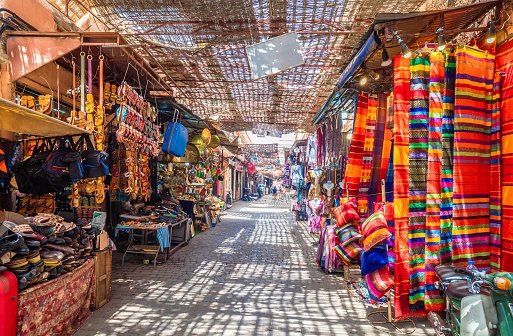Introduction.
The idea of starting a business is exciting, and when that business is centered around something as rich and flavorful as African cuisine, it’s even more thrilling! African food is gaining popularity across the U.S., with more and more people craving the bold flavors, unique spices, and diverse dishes from the continent. But like with any business, knowing where to start can feel overwhelming.
How do you turn your passion for African food into a successful business? What steps should you follow? How can you stand out in a crowded market?
In this article, I’ll guide you through everything you need to know to start an African food business in the USA. From understanding the market to handling the legal side of things, I’ll break it down for you step by step.
Why African Food?
First off, let’s talk about why African food is such a great business idea. African cuisine is incredibly diverse, with each region offering something unique.
Whether it’s the spicy stews of West Africa, the rich curries of East Africa, or the flavorful meats of Southern Africa, there’s so much to explore.
As of 2021, the U.S. foodservice industry generated over $800 billion, and with the growing interest in ethnic cuisines, African food is catching the attention of adventurous eaters.
Food trends show that people are more open than ever to trying new dishes from different cultures, and African food, with its deep roots in history and tradition, fits the bill perfectly.
Plus, African communities are widespread in the U.S., meaning there’s already a built-in customer base.
So, starting an African food business has the potential to tap into both cultural pride and a growing demand for diverse food options.
How Do I Start an African Food Business?
1. Research the Market
Before jumping into anything, it’s crucial to understand your market. You need to figure out who your customers are and what they want. Do some research to see if there’s a demand for African food in your area.
You can do this by checking out local competitors, looking into social media food groups, or even asking people from African communities if they’d be interested in your offerings.
It’s important to know which type of African food is in demand. For example, jollof rice, plantains, and suya (grilled meat skewers) have become popular among non-Africans, while traditional dishes might appeal more to African immigrants or people from the diaspora.
2. Find Your Niche
African food is broad and diverse. If you’re not sure where to begin, start by narrowing your focus. Will you be offering a particular region’s food, like Nigerian, Ethiopian, or Kenyan cuisine?
Or perhaps you’d like to serve a mix of dishes from across Africa? You could even focus on a specific niche like vegan African food or modern takes on traditional dishes.
Figuring out your niche will help you define your brand, your target audience, and what makes your business stand out. A strong concept will attract customers who resonate with your unique offering.
3. Create a Business Plan
Now that you have a sense of what your business will be about, it’s time to create a business plan. This doesn’t have to be complicated, but you need to think about the following:
- Your vision and mission: What do you want to achieve with your African food business? Who are you serving, and why?
- Menu: What items will you sell, and what makes them special? Will you offer full meals, snacks, or street food?
- Pricing: How will you price your food? Make sure your prices reflect both the quality of your dishes and the target market.
- Costs: Consider the costs of ingredients, equipment, and permits.
- Marketing: How will you get the word out about your business? Social media, flyers, and word of mouth all play a part in marketing, but having a plan for online presence, like a website or delivery options, is key.
A solid plan will help you stay on track and work through challenges as you grow your business.
4. Choose the Right Location
When it comes to food businesses, location is crucial. You want to pick a place that’s easily accessible, with a steady flow of potential customers.
If you’re opening a restaurant, find a spot near areas with African communities or places where people are looking for new dining experiences.
If you’re planning a food truck or pop-up stand, pick high-traffic areas like downtown, farmers’ markets, or events that draw food lovers.
The cost of rent and utilities will depend on the location you choose, so weigh your options carefully.
5. Get Legal & Business Documents in Order
Every business needs to be registered and legal. To start your African food business, you’ll need to:
- Register your business: Decide on a business name and register it with the state. You’ll also need to choose a business structure, like an LLC (Limited Liability Company), to protect your personal assets.
- Get your licenses and permits: Food businesses need several permits, including health permits, food handler’s licenses, and sometimes a liquor license if you plan on serving alcohol. Check with your local health department for specifics.
- Insurance: It’s important to protect your business with the right insurance, such as general liability insurance and worker’s compensation insurance.
This step is crucial because you don’t want to run into legal trouble after you’ve started.
6. Source Quality Ingredients
Authentic African food requires high-quality, authentic ingredients. Depending on your location, finding these ingredients might be tricky, but it’s worth the effort.
Look for African markets, wholesalers, or online suppliers that offer spices, grains, and meat products specific to the region. You could even partner with local farmers if you want to focus on sustainable and locally sourced produce.
Keep in mind that your menu will depend on the availability of ingredients, so ensure that you have a reliable supply chain in place.
7. Start Small & Build a Brand
If you’re just starting out, it might be best to keep things simple. Consider launching a food truck, catering service, or pop-up stand before diving into a full-scale restaurant. This allows you to test the waters, understand your customer base, and refine your recipes.
Building a brand is just as important as your menu. Create a logo, design your packaging, and make sure your social media presence is strong.
Share your story and the uniqueness of African food. Your business isn’t just about the food—it’s about the culture and the community you’re building around it.
FAQs
Q: How much does it cost to start an African food business?
Starting a food business can cost anywhere from $5,000 to over $50,000, depending on whether you’re opening a food truck or a restaurant. Costs include equipment, rent, permits, insurance, and ingredients.
Q: How do I make my African food business stand out?
Offer something unique. This could be the quality of your ingredients, the authenticity of your dishes, or a focus on sustainability. Also, be active on social media and engage with your community.
Q: What are some popular African dishes to start with?
Jollof rice, pounded yam, fufu, suya, and sambusas are all crowd favorites. If you’re focusing on drinks, try offering traditional beverages like hibiscus tea (bissap) or palm wine.
Conclusion
Starting an African food business in the USA is a rewarding and exciting venture, especially as people continue to explore diverse flavors and cuisines.
By doing thorough research, choosing the right niche, and being committed to quality and authenticity, you can create a successful business that celebrates the richness of African culinary traditions.
But here’s the big question: Are you ready to take the plunge and share the vibrant world of African food with others?





GIPHY App Key not set. Please check settings